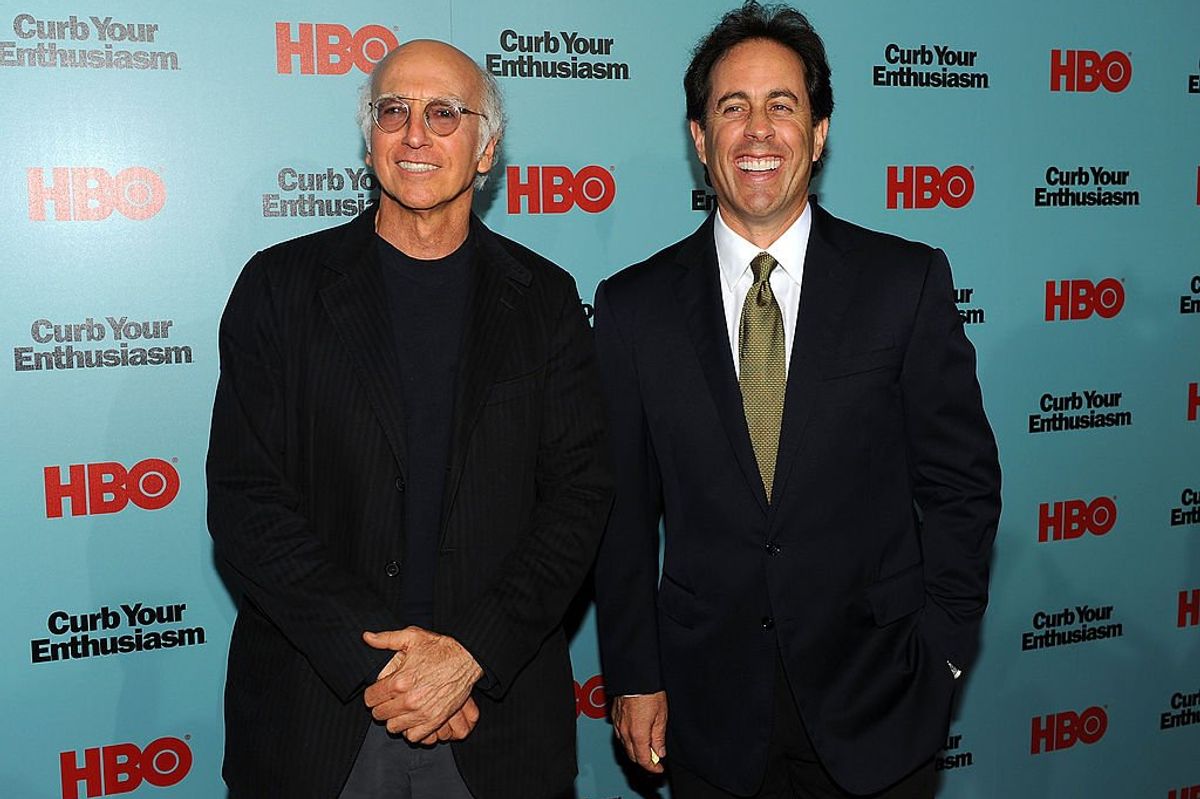Celebrities
Harriet Brewis
May 11, 2024
Comedian Michael Spicer imagined what really went on in that Boris Johnson …
content.jwplatform.com
If there’s one thing comedians Jerry Seinfed and Michael Spicer can agree on, it’s that people will always need comedy.
And yet, Seinfeld – who’s best known for his hit nine-season series of the same name – believes there’s now a dearth of good sitcoms on TV. And this, he insists, is the fault of one specific group.
The 70-year-old stand-up complained in an interview with The New Yorker last month: “It used to be, you would go home at the end of the day, [... and] you just expected, there’ll be some funny stuff we can watch on TV tonight.”
But, he went on, these days you have to ask “Where is it?” And this, he said: “Is the result of the extreme left and P.C. crap, and people worrying so much about offending other people.
Spicer, however, thinks comments like these are a load of old crap, not political correctness.
The British comic, 47, who has just launched a new series for BBC Radio 4, told indy100: “[Seinfeld’s] a dinosaur and he doesn’t know what he’s talking about.
“It’s symptomatic – it’s the John Cleese stage of a comedian’s career where things don’t make sense to them any more. It’s an old man yelling at modernity.
"It’s also just a blatantly false argument.”
Still, Spicer was quick to add: “I should qualify this by saying that I'm a huge Seinfeld fan.
“I think that those nine seasons, from a comedy writer's point of view, are absolutely fascinating in terms of their evolution.”

Ultimately, both Seinfeld and his younger, English counterpart, are masters of satire, they just take a very different approach.
Whereas the 70-year-old has acknowledged that many of the jokes he made in his 1990s sitcom would get him cancelled today, Spicer’s whole MO is to parody and ridicule those who indulge in offensive behaviour.
His new series No Room consists of 15-minute episodes, each one packed with short skits tackling the topics that most provoke us.
From a war correspondent reporting from the frontline on Taylor Swift’s new album, to a boardroom full of white men (all called Tim) brainstorming how to “fix” racism, to government advisers trying to come up with a more palatable alternative to the name “food banks” (“community nosh closets, anyone?”), Spicer addresses everything from bigotry to big clichés in football commentary.
And despite taking aim at the government’s Rwanda policy as well as other obviously right-wing issues and tropes, he stresses that he’s not trying to be political with his work.
“I also attack, or parody, things that aren't necessarily a left or right issue. For instance, I spoof filmmaking, presenters like Louis Theroux, the podcast culture, things like that, so I’m hoping there's enough for everyone.”
And whilst Seinfeld grumbled that there’s nothing funny on TV anymore, Spicer suggested this is because the comedy landscape has dramatically and rapidly evolved in recent years.
The arrival of streaming and social media has meant that people no longer rely on linear TV channels to get their laughs in, as they did when Seinfeld hit the airways.
Instead, they can turn to Netflix, TikTok or even Twitter/X – the platform where Spicer made his name.

The 47-year-old – whose The Room Next Door videos propelled him to internet stardom during the Covid pandemic – pointed out: “The way we all consume comedy has completely changed.
“In the days of things like Friends or Only Fools and Horses there were just four channels and you had to stay in to watch your favourite programmes, so television viewing was this very precious, communal thing.
“But now, people can get their laughs from so many different places: whether that’s reality shows like GoggleBox, sketches on YouTube or watching reruns of Tony Hancock from the 1950s.”
He also emphasised that where aspiring comedians struggled to be heard in the past, now everyone can have their own platform. And, in some cases, this simply doesn’t translate to the big or silver screen.
“TV execs will try to grab many of these successful online comics and say, ‘Can you do what you are doing on TV? But, straight away, the magic dies a little bit really, because so much of it is in the person holding the phone, doing the sketch.”
Ultimately, he finds the diversity of options “liberating,” especially given the challenges of breaking into the industry.
“Growing up, trying to get into comedy was incredibly difficult without the internet,” he said. “You wouldn’t have heard of me if it weren’t for social media.”
This, he noted, is because it was largely an “old boys’ club.”
Well, haven’t you heard? Old boys’ clubs are dead. (Sorry, Jerry.) And now, it’s time to look to the future, even if that means looking less at TV screens.
Sign up for our free Indy100 weekly newsletter
Have your say in our news democracy. Click the upvote icon at the top of the page to help raise this article through the indy100 rankings
Top 100
The Conversation (0)














